Interview with writer / actor Emeka Agada on his play THE LAST BLACK MESSIAH at Etcetera Theatre 27 – 29 August 2025
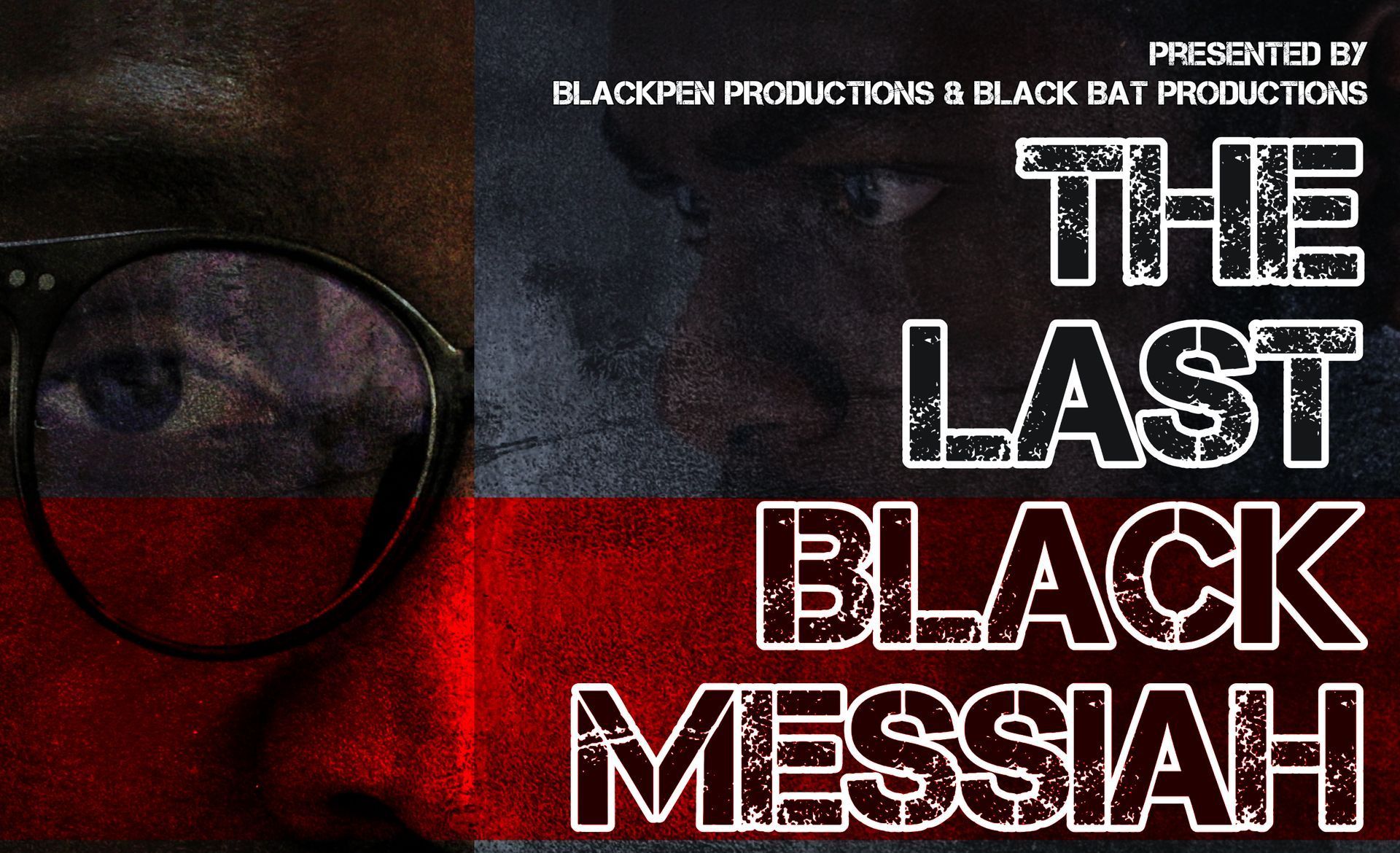
THE LAST BLACK MESSIAH written by and starring Emeka Agada, co-stars Kenneth Butler, and is directed by award-nominated Nathaniel Brimmer-Beller. As an actor Emeka is known for his portrayal of Dillion James in Nurses (2020) for which he received a ACTRA Award nomination, Reacher (2022) and Ruby and the Well (2022).
Image: Emeka Agada
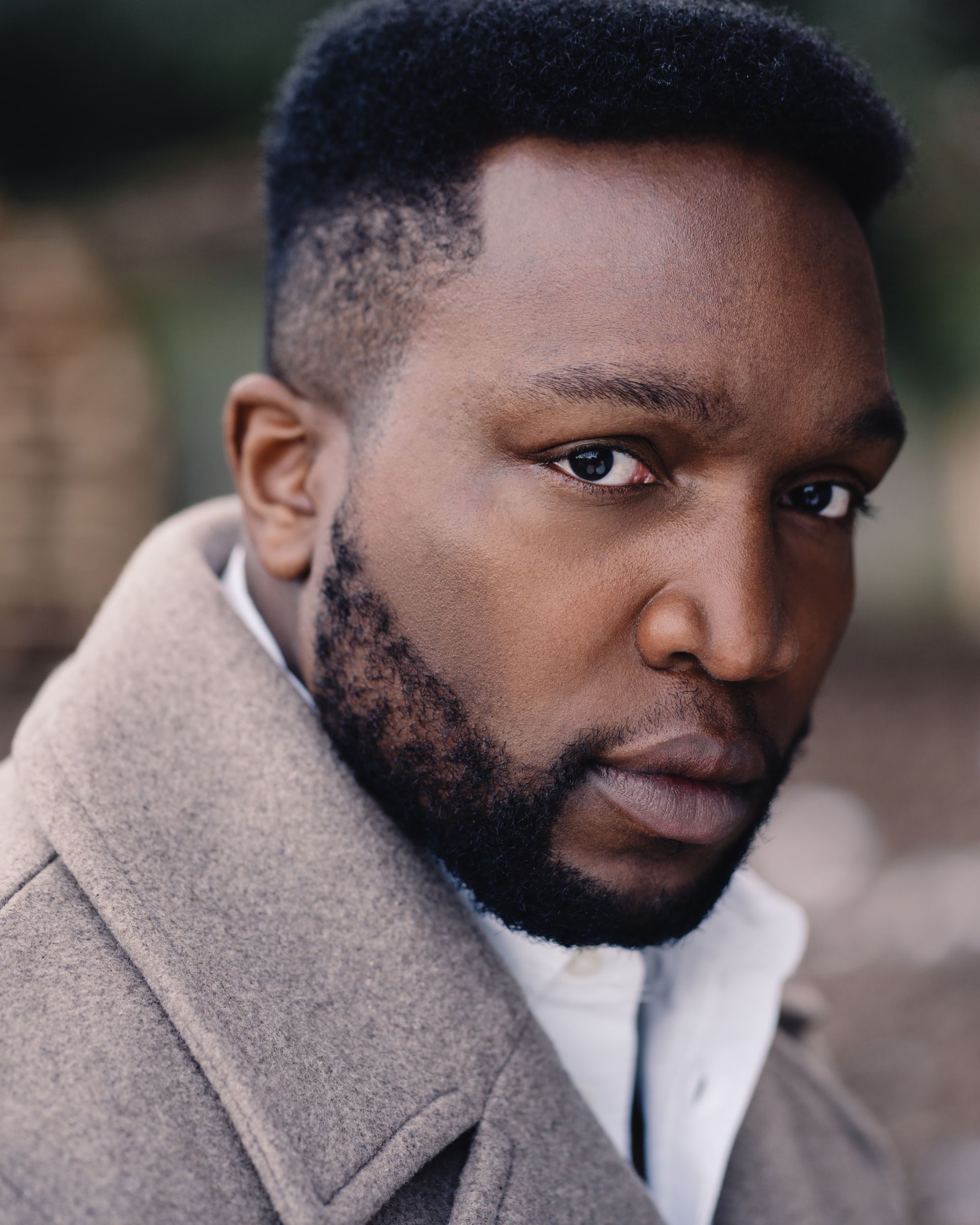
Hello Emeka, delighted to have this opportunity to find out more about your play THE LAST BLACK MESSIAH. Firstly, could you tell us a little about the story.
Thank you! I’m glad to be speaking with you today about this piece I’ve written. This story is for the people. We explore a very human story through the eyes of two characters; a man who has dedicated his life to liberation and carries the weight of the world on his shoulders and a former student from his time at Howard University, who was one of his star pupils. When our story begins, Dr.Oko is on death row facing conspiracy and treason charges against the state. Asante, someone who once looked up to him, makes an unexpecting visit to capture his final words. Between these two characters, we explore what revolution truly means and the cost of one.
It’s deeply moving but also a contains an intellectual sparing match reflecting a time in history that feels far away yet eerily like our own presently. The story is set in 1991, it’s a pivotal moment globally, while the United States is still grappling with the effects of the Reagan era.
There is a lot of heart in this story, and that’s intentional. At the end of the day. It’s about humanity, about connection and about what we leave behind.
What is the driving force behind the play?
The driving force of this play is community and what shapes it for us. I wanted to explore what happens when ideals collide with mortality, and the themes that emerge from it like: integrity, power, survival, justice, race and endurance of hope when the odds are overwhelming. What is the real price of one’s conviction. And underneath it all, what do we leave behind. Revolutions don’t start out of nowhere; they grow out of years, sometimes generations of resistance, understanding and political ideologies. And all of that, takes a toll on the human spirit.
Is there a personal trajectory that you’d like to share with us?
Yes, very personal and I think this is the type of story that requires your entire being. Outside of acting, I’ve spent a great deal of time working with young Black kids in London. I’ve seen how much my presence alone can make a difference in such children’s life. And when I meet older youths, not always but I feel a disconnect, sometimes a loss of self-belief. Is that about the absence of community? Is it about the pressures they face every day in a country where the gap between communities grows even larger? I don’t have the answers, but I do know I want to help them find those answers. That is what The Last Black Messiah is, it’s part of what I leave behind.
We’re pleased to see that your director is Nathaniel Brimmer-Beller, as we’ve seen some of his productions on the pub theatre circuit, we have tremendous respect for his work. How did you meet him and how did the collaboration come about?
I’ve been aware of Nathaniel’s work for at least a year now on the pub theatre circuit, though we had never crossed paths before this project. When I finished the script, I knew I needed a director who wasn’t afraid to create bold art, because this play lives in that space. I reached out to Nathaniel via social media; we spoke and connected instantly. He sees theatre as I do; getting to the heart of the story and creating work that doesn’t hold back, work that challenges the audience and breathes a rich experience.
Nathaniel is known for his bold and innovative theatre work. With plenty of possibilities in THE LAST BLACK MESSIAH, what is likely to be particularly striking?
Nathaniel knows the story and trusts us as the actors to bring a level of authenticity to our characters and relationship. He understands the drama, the emotions but never lets the play become too flat. He knows what the audience wants and doesn’t want to see. He’s created a piece that is raw and alive, where the silences speak as loudly as the words.
How would you describe your style of acting?
I don’t know how I would describe my style; it’s not something I spend much time thinking about. For me, it’s always about finding the truth of the character. Sometimes that takes you to places that aren’t so easy to reach, that demand a great deal of time and resources. But the aim is always the same, to get to the heart, the voice, the life of that person even when it gets ugly.
Are there other roles that you’ve played that will feed into your role as Dr. Oko in THE LAST BLACK MESSIAH?
There are elements of roles I’ve lived before, but Dr.Oko is different. He is not here for acceptance from the system; he is here to liberate humanity. That makes him both ambitious but dangerous and that’s a complexity I’ve never inhabited before. Without a doubt, this is the most challenging role to date.
Before acting, you were an athlete having received college letters in more than one sport. How does this feed into your acting / writing?
This is a great question, I don’t get asked often. I think athletics and acting go hand and hand, though I know some artists shy away from sports. There is a rhythm and musicality to the game, and sometimes the best athletes are dipping their feet into the arts to develop their craft. I know some friends who have taken ballet classes to refine their foot work on the court. For me, my biggest take away from athletics is discipline. To compete at your best, no matter the sport, it takes a bit of prep. Writing is no different. Acting is no different. You train, you push, and you give everything you have. I’m always finding ways to use my background as an athlete in my work.
You’ve also dipped a toe into film making, having written and co-directed your first film, AfriKan and your recent award nominated web series, Black Smith. What made THE LAST BLACK MESSIAH a story for theatre rather than film?
There used to be this old saying, “If you want to watch something, go to the movies but if you want to listen, go to the theatre.” I wrote this piece so people can sit, listen and then talk to each other afterwards, face to face. That’s how it used to be. Communities would gather, not just to be entertained, but to engage with ideas that mattered to them. Of course, today’s conversations are amplified by the internet and that has its value. But there is something profoundly human about sharing that experience in a room together.
What is your experience of London?
London is fascinating to me. It reminds me of New York a lot, a city I am very familiar with. On its own, London is a city of great growth and power but also has a struggle within it. At times, the city can get lonely, but I usually find a quick trip to the shop for some jollof rice or Egusi soup changes that 😊
What kind of relevance can you draw from your play which equates to life in London.
London has its own history of black voices pressing against the weight of an empire. From the Windrush generation, the British Black Panthers and Brixton Black Women’s Group, right up to present day. Dr.Oko’s fight is not London’s fight directly, but the questions he raises about justice and power, those questions live everywhere. They’re global questions. I think that’s where the play lives.
The show is at the Etcetera Theatre in Camden. Do you have particular connection with the area, theatre, or pub theatres in general?
Camden has always felt like a place for rich ideas. A place where rebellion thrives. And the theatre itself, is a reminder of what theatre is: humans being in a room, no flash or excess, just a raw story that cuts through the noise.
Finally, what are you particularly looking forward to sharing with audiences?
I’m looking forward to taking the audience back to that feeling of being in a classroom or a university hall, where ideas collide and discussion begins. I want to leave them with something that lingers, a question they carry home: What would I give for what I believe? For me, The Last Black Messiah is also about leaving behind a story for young Black youth, and for anyone struggling to find their identity no matter where they come from.
When I was in drama school, I loved exploring plays from the Harlem Renaissance and beyond. We studied August Wilson, Lynn Nottage, Lorraine Hansberry, Dominique Morisseau, playwrights who spoke to the struggles of African Americans in their time, struggles that have changed, but not disappeared. And then there were pioneers like Angelina Weld Grimké—the first African American woman to have her play performed publicly. Her writing moved me. She was telling bold stories at a time when Black people were being lynched.
The spirit, the courage to speak when silence was safer, that’s what I hope this play carries. And that’s what I hope the audience leaves with.
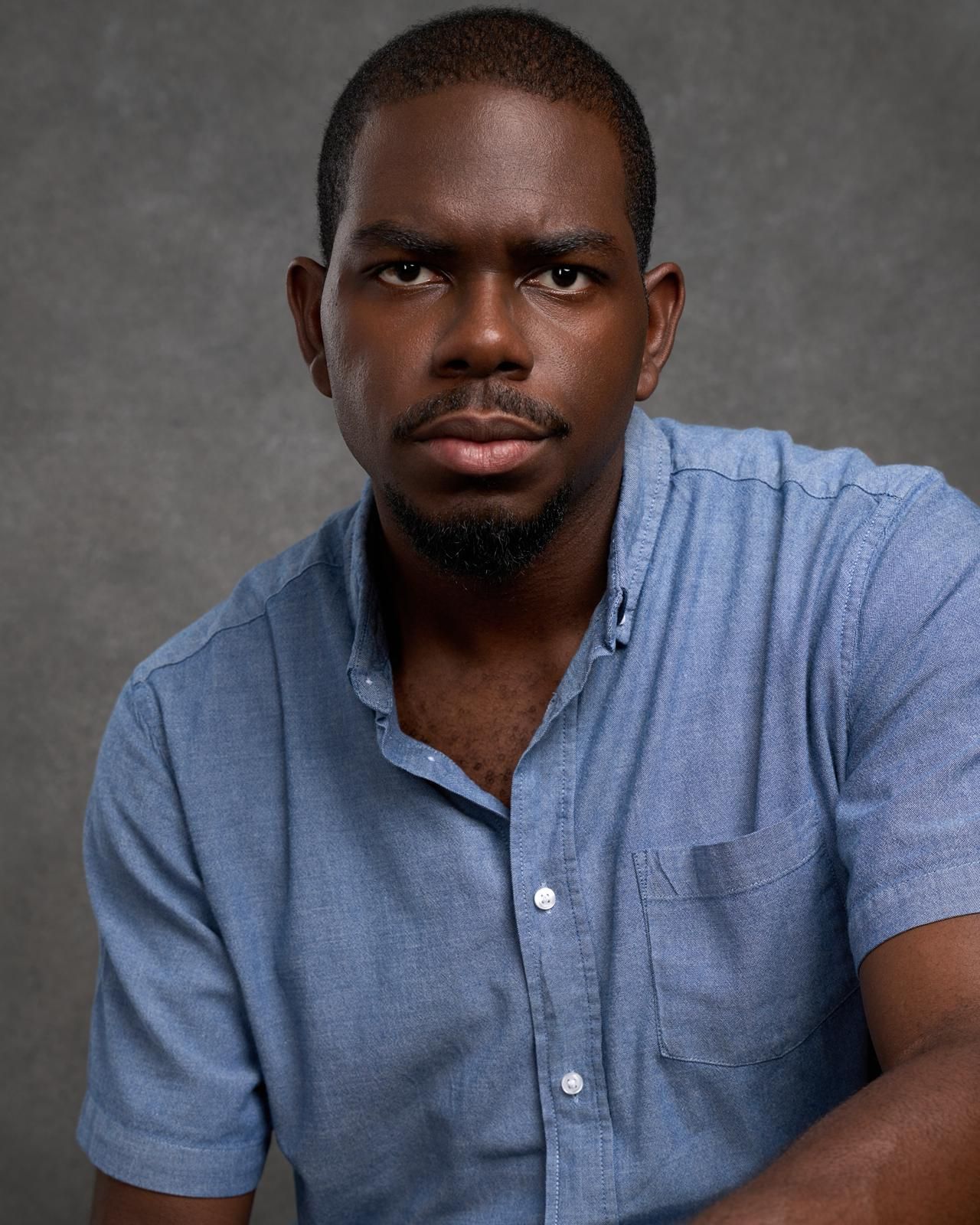
Image: Kenneth Butler
Question to Kenneth: How did you get involved in the project and what are you going to bring to your role as the former student of the condemned Dr Oko?
I got involved with this project from being good friends with Emeka. We met through drama school, him being on his way out as I was on the way in, we never got a chance to work together but knew we wanted to collaborate on something, and this was the perfect opportunity. I look forward to playing Asante’s internal battle as he is balances his respect and honor for Dr. Oko with the difficult choices he faces when loyalty, love and personal stakes collide.
Image: Director Nathaniel Brimmer-Beller
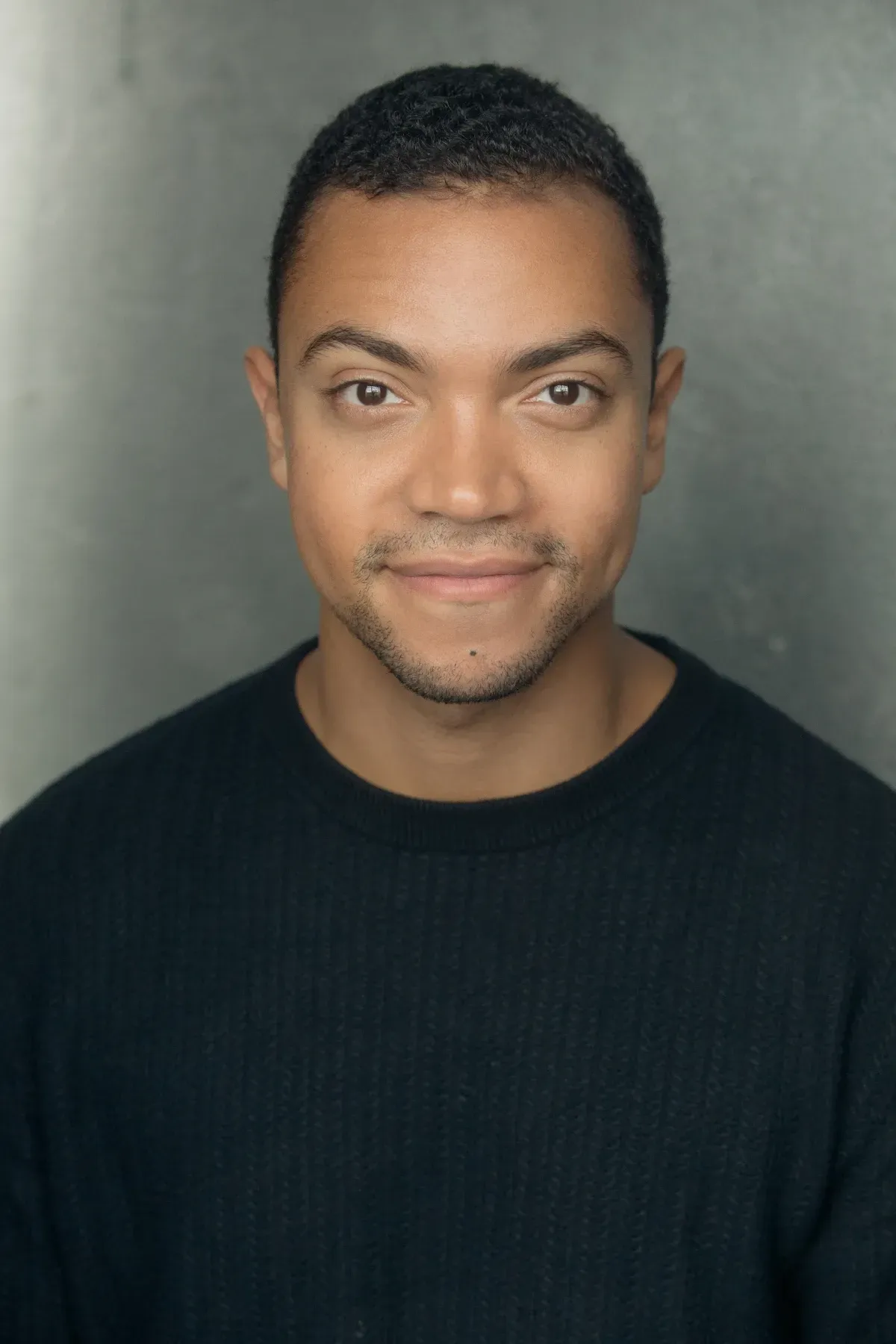
Question to Nathaniel: You have a very dynamic and exciting style of directing for your own work. What is going to be different in directing Emeka's work?
Directing is one of the most fun jobs on the planet if you enjoy problem solving, which lucky for me, I do. The main problem (and problem is in no way a negative term, here) of any play is finding a plausible answer to: How on Earth we can ask someone to spend their precious time watching this? If there is a good answer to that, then the play sings, and we can put it up happily. Emeka’s play arrives with a fantastic answer to that question before I had anything to do with it — the problem-solving I bring to The Last Black Messiah aims to synthesize all his unique and passionate ideas into a piece of theatre that will engage the mind, the gut and the moral compass as the play’s setup already does magnificently. When directing, or more often co-directing my own work, I already have my inklings of where the story needs to build, simmer, or explode, whereas Emeka and Kenny’s characters have a unique, shifting relationship that questions some of my dramatic-tension tendencies, and this change has been an exciting, fascinating process. Emeka is asking questions I find compelling in a different manner than I am used to as a director and playwright, and the fun of this job has been combining our experiences into something both of us would stop and listen to.
The Last Black Messiah by Emeka Agada
27 – 29 August
Etcetera Theatre, Camden
Presented by BlackPen Productions & Black Bat Productions
Starring Emeka Agada with Kenneth Butler
Directed by Nathaniel Brimmer-Beller
Set in a fractured America transitioning from the Reagan era into the Bush presidency, The Last Black Messiah is a touching two-hander political drama that unfolds inside a prison. Dr. Oko, an ex-professor and black revolutionary leader, awaits his execution. When his former student makes a surprise visit to the once renowned professor, not everything is as it seems.
Through memories and clashing convictions, the play explores the struggle for power and justice in a nation whose priorities overlook the needs of the people.
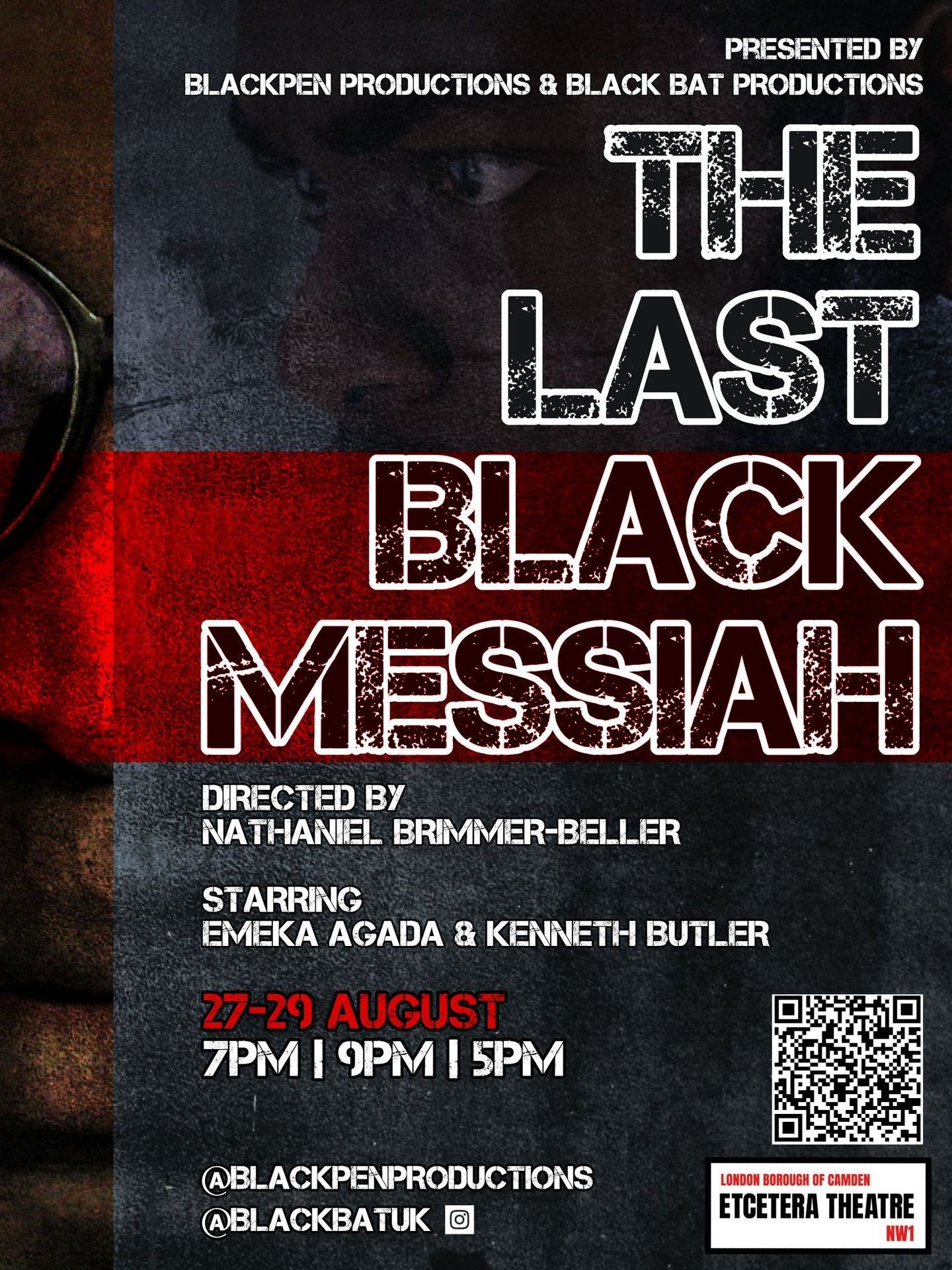
Cast & Creative Team
Emeka Agada
Emeka Agada is an award nominated actor who rose to international attention for his viral appearance in Amazon Prime’s original series, Reacher. On film, he recently portrayed Hip-Hop legend Paradise Gray in an upcoming biopic starring David Harewood. His stage work includes The Midnight Caller and Kim’s Convenience. His original sketch comedy web series Black Smith was recently an official selection at TINFF, earning three nominations, including Best Web Series and Best Actor.
Kenneth Butler
Kenneth Butler is an American actor and filmmaker based in the UK. Originally from Atlanta, Georgia, he recently completed his MFA in Acting at the Guildford School of Acting. He also originated the role of Phil in Flying Ant Day and Abon Bridges in Look Forward: The Ruby Bridges Story. His further stage credits include A Midsummer Night’s Dream, Jane Eyre, and Pericles, with performances at international festivals such as the Sibiu International Theatre Festival and the Verona Shakespeare Fringe.
Nathaniel Brimmer-Beller
Nathaniel Brimmer-Beller is a director, actor, screenwriter, and published playwright. He has directed more than 30 theatrical productions, including the UK premiere of Pulitzer Prize-winner James Ijames’ White and three runs of his acclaimed play In Everglade Studio. His work has been nominated for the George Devine Award for Most Promising Playwright (for Blood Red Apples & Deep Gold Honey), the BBC Writersroom Popcorn Award for Best New Writing (for In Everglade Studio), and an Offie (for Port City Signature), and won a Bursary Prize for writing and performance at Screenshot, hosted by the Royal Court (for The Nomineers, a monologue adaptation of his play Press). Most recently directed the media satire Press (★★★★★ “Genius” – Broadway Baby)






